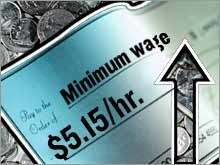Minimum wage bill stalls in Senate Republican bill, denounced as 'ploy' by Democrats, would also cut estate taxes. WASHINGTON (CNN) -- Senate Republicans Thursday night failed to advance a bill coupling a 40-percent increase in the minimum wage with a cut in estate taxes, which Democratic leaders had denounced as an election-year ploy. A move by GOP leaders to cut off debate and move to a final vote on the bill failed to get the 60 votes it needed under Senate rules. The vote, which fell mostly along party lines, was 56 to 42.
After the vote, Senate Majority Leader Bill Frist pulled the measure from the Senate floor. However, he switched his vote on the motion to cut off debate from "yes" to "no," a procedural maneuver which allows him to try to advance the bill again when lawmakers return from their August recess. Noting that a majority of senators favored the bill, which passed the House last week, Frist said he was "confident that we could have finished the measure this weekend and presented it to the president in the next couple of days." "I hope that the Democratic senators will rethink, long and hard, over the weeks to come before we return for business in September," Frist said. Thursday's vote was a victory for Senate Minority Leader Harry Reid, who had vowed to block the measure. The bill would have raised the minimum wage from $5.15 to $7.25 per hour over three years, the first increase in a decade. It would also have replaced current cuts in the estate tax, due to expire in 2010, with new provisions eliminating the tax entirely on estates worth up to $5 million - $10 million for a married couple - and capping the tax at 15 percent on estates up to $25 million. Larger estates would be taxed at 30 percent. In an effort to draw support of enough Democratic senators to advance the bill, Republican leaders also sweetened the measure with extensions of tax credits for state and local taxes, research and development and college tuition, which many Democrats support, as well as a program to reclaim abandoned mines, pushed by senators from coal-producing states. But in the end, despite their traditional support for a minimum wage increase, most Senate Democrats voted not to advance the bill because it was coupled with the estate tax cut, which benefits higher-income taxpayers. Senators from both parties have vowed to make both the minimum wage and estate tax key issues in the upcoming mid-term elections. Last week, under pressure from about 50 moderate Republicans who wanted to boost the minimum wage, House GOP leaders agreed to a compromise measure that also included an estate tax cut to assuage conservatives opposed to a minimum wage boost. The bill passed the House 230-180. |
| ||||||||||


